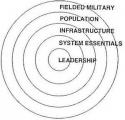Paul Collier and his colleagues have argued that many civil wars are caused by economic rather than sociopolitical factors, and by loot-seeking rather than by justice-seeking.5 As Collier and Hoeffler note, this economic approach to understanding civil war differs from political science approaches by focusing on a different motivation for violence—greed, not grievance—and a different explanation for the outbreak of war, atypical opportunities and not atypical grievances.6 The economic approach focuses on the opportunities that arise to belligerents, especially insurgents, during times of civil war. While war leads to great material losses on a societal basis, this does not mean that “war is a disaster for almost everyone concerned.” As David Keen argues, war is not simply the breakdown of order, economy, and social organization, but “the emergence of an alternative system of profit,
power, and even protection.”7 To put it simply, war has functions for some actors. The insecurity and unpredictability of war, coupled with the breakdown or weakening of law and order, implies the turn to a more opportunistic society; an increase in criminality; the disruption of markets; and opportunities for what Collier calls “rent-seeking predation.”8
These consequences are immensely detrimental for society at large, but provide specific opportunities for armed groups to reap significant economic benefits: some people manage to do well out of war.9












 .
.
Bookmarks